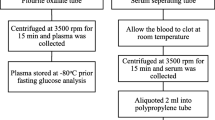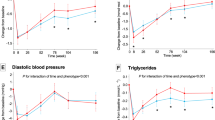Abstract
Although weight is an important intervention target among patients with metabolic syndrome, few trials have recruited low-income minority populations. The Community Health and Risk-reduction for Metabolic Syndrome randomized controlled trial aimed to examine the effects of a lifestyle intervention on weight and metabolic syndrome components among low-income minority adults. We randomized 120 adults with metabolic syndrome to standard medical care (N = 60) or a lifestyle intervention (N = 60). Using an intent-to-treat approach, we found significant intervention effects on weight [B = −0.452; SE = 0.122; 95 % confidence intervals (CI) −0.653 to −0.251) and glucose levels at 6-months (B = −0.522, SE = 0.234, 95 % CI −0.907 to −0.138). These changes were maintained through the 12-month assessment. No significant effects were observed on insulin resistance or other metabolic syndrome components. Our intervention was successful in achieving modest but significant weight loss and reduction in fasting glucose among low-income minority subjects with metabolic syndrome.


Similar content being viewed by others
References
Alberti, K. G., Zimmet, P., & Shaw, J. (2006). Metabolic syndrome—A new world-wide definition. A consensus statement from the International Diabetes Federation. Diabetic Medicine, 23, 469–480. doi:10.1111/j.1464-5491.2006.01858.x
Bo, S., Ciccone, G., Baldi, C., Benini, L., Dusio, F., Forastiere, G., … Pagano, G. (2007). Effectiveness of a lifestyle intervention on metabolic syndrome. A randomized controlled trial. Journal of General Internal Medicine, 22, 1695–1703. doi:10.1007/s11606-007-0399-6
Cheung, B. M., Ong, K. L., Cherny, S. S., Sham, P. C., Tso, A. W., & Lam, K. S. (2009). Diabetes prevalence and therapeutic target achievement in the United States, 1999–2006. American Journal of Medicine, 122, 443–453. doi:10.1016/j.amjmed.2008.09.047
Cox, T. L., Krukowski, R., Love, S. J., Eddings, K., DiCarlo, M., Chang, J. Y., … West, D. S. (2013). Stress management-augmented behavioral weight loss intervention for African American women: A pilot, randomized controlled trial. Health Education & Behavior, 40, 78–87. doi:10.1177/1090198112439411
Ford, E. S., Giles, W. H., & Dietz, W. H. (2002). Prevalence of the metabolic syndrome among US adults: Findings from the third National Health and Nutrition Examination Survey. Journal of the American Medical Association, 287, 356–359.
Ford, E. S., Li, C., & Zhao, G. (2010). Prevalence and correlates of metabolic syndrome based on a harmonious definition among adults in the US. Journal of the Diabetes, 2, 180–193. doi:10.1111/j.1753-0407.2010.00078.x
Gordon-Larsen, P., Nelson, M. C., Page, P., & Popkin, B. M. (2006). Inequality in the built environment underlies key health disparities in physical activity and obesity. Pediatrics, 117, 417–424. doi:10.1542/peds.2005-0058
Grundy, S. M., Cleeman, J. I., Daniels, S. R., Donato, K. A., Eckel, R. H., Franklin, B. A., … Fernando, C. (2005). Diagnosis and management of the metabolic syndrome: An American Heart Association/National Heart, Lung, and Blood Institute scientific statement: Executive summary. Critical Pathways in Cardiology, 4, 198–203.
Gutt, M., Davis, C. L., Spitzer, S. B., Llabre, M. M., Kumar, M., Czarnecki, E. M., … Marks, J. B. (2000). Validation of the insulin sensitivity index (ISI(0,120)): Comparison with other measures. Diabetes Research and Clinical Practice, 47, 177–184.
Haskell, W. L., Lee, I. M., Pate, R. R., Powell, K. E., Blair, S. N., Franklin, B. A., … Bauman, A. (2007). Physical activity and public health: Updated recommendation for adults from the American College of Sports Medicine and the American Heart Association. Medicine and Science in Sports and Exercise, 39, 1423–1434. doi:10.1249/mss.0b013e3180616b27
Hert, M. D., Dekker, J. M., Wood, D., Kahl, K. G., & Moller, H. J. (2009). Cardiovascular disease and diabetes in people with severe mental illness. Revista de Psiquiatría y Salud Mental, 2, 49–59. doi:10.1016/S1888-9891(09)70714-1
Keyzer, J. F., Melnikow, J., Kuppermann, M., Birch, S., Kuenneth, C., Nuovo, J., … Rooney, M. (2005). Recruitment strategies for minority participation: Challenges and cost lessons from the POWER interview. Ethnicity & Disease, 15, 395–406.
Kingry, C., Bastien, A., Booth, G., Geraci, T. S., Kirpach, B. R., Lovato, L. C., … Probstfield, J. L. (2007). Recruitment strategies in the action to control cardiovascular risk in diabetes (ACCORD) trial. American Journal of Cardiology, 99, 68i–79i. doi:10.1016/j.amjcard.2007.03.025
Kumanyika, S., Fassbender, J., Phipps, E., Tan-Torres, S., Localio, R., Morales, K. H., … Wadden, T. A. (2011). Design, recruitment and start up of a primary care weight loss trial targeting African American and Hispanic adults. Contemporary Clinical Trials, 32, 215–224. doi: 10.1016/j.cct.2010.11.002
Kumanyika, S. K., Wadden, T. A., Shults, J., Fassbender, J. E., Brown, S. D., Bowman, M. A., … Wu, X. (2009). Trial of family and friend support for weight loss in African American adults. Archives of Internal Medicine, 169, 1795–1804. doi:10.1001/archinternmed.2009.337
Lovato, L. C., Hill, K., Hertert, S., Hunninghake, D. B., & Probstfield, J. L. (1997). Recruitment for controlled clinical trials: Literature summary and annotated bibliography. Controlled Clinical Trials, 18, 328–352.
Matthews, D. R., Hosker, J. P., Rudenski, A. S., Naylor, B. A., Treacher, D. F., & Turner, R. C. (1985). Homeostasis model assessment: Insulin resistance and beta-cell function from fasting plasma glucose and insulin concentrations in man. Diabetologia, 28, 412–419.
Muthén, B. O., & Curran, P. J. (1997). General longitudinal modeling of individual differences in experimental designs: A latent variable framework for analysis and power estimation. Psychological Methods, 2, 371–402. doi:10.1037/1082-989x.2.4.371
Newcomer, J. W., & Hennekens, C. H. (2007). Severe mental illness and risk of cardiovascular disease. Journal of the American Medical Association, 298, 1794–1796. doi:10.1001/jama.298.15.1794
Orchard, T. J., Temprosa, M., Goldberg, R., Haffner, S., Ratner, R., Marcovina, S., & Fowler, S. (2005). The effect of metformin and intensive lifestyle intervention on the metabolic syndrome: The Diabetes Prevention Program randomized trial. Annals of Internal Medicine, 142, 611–619.
Park, Y. W., Zhu, S., Palaniappan, L., Heshka, S., Carnethon, M. R., & Heymsfield, S. B. (2003). The metabolic syndrome: Prevalence and associated risk factor findings in the US population from the Third National Health and Nutrition Examination Survey, 1988–1994. Archives of Internal Medicine, 163, 427–436.
Ruggiero, L., Oros, S., & Choi, Y. K. (2011). Community-based translation of the diabetes prevention program’s lifestyle intervention in an underserved Latino population. The Diabetes Educator, 37, 564–572. doi:10.1177/0145721711411107
Samuel-Hodge, C. D., Johnson, C. M., Braxton, D. F., & Lackey, M. (2014). Effectiveness of diabetes prevention program translations among African Americans. Obesity Reviews, 15, 107–124. doi:10.1111/obr.12211
Schneiderman, N., Chirinos, D. A., Aviles-Santa, M. L., & Heiss, G. (2014). Challenges in preventing heart disease in hispanics: Early lessons learned from the Hispanic Community Health Study/Study of Latinos (HCHS/SOL). Progress in Cardiovascular Diseases, 57, 253–261. doi:10.1016/j.pcad.2014.08.004
The Diabetes Prevention Program. (1999). Design and methods for a clinical trial in the prevention of type 2 diabetes. Diabetes Care, 22, 623–634.
Third Report of the National Cholesterol Education Program (NCEP) Expert Panel on Detection, Evaluation, and Treatment of High Blood Cholesterol in Adults (Adult Treatment Panel III) final report. (2002). Circulation, 106(25), 3143–3421.
Uusitupa, M., Lindi, V., Louheranta, A., Salopuro, T., Lindstrom, J., Tuomilehto, J., & Finnish Diabetes Prevention Study Group. (2003). Long-term improvement in insulin sensitivity by changing lifestyles of people with impaired glucose tolerance: 4-year results from the Finnish Diabetes Prevention Study. Diabetes, 52, 2532–2538.
Watkins, L. L., Sherwood, A., Feinglos, M., Hinderliter, A., Babyak, M., Gullette, E., … Blumenthal, J. A. (2003). Effects of exercise and weight loss on cardiac risk factors associated with syndrome X. Archives of Internal Medicine, 163, 1889–1895. doi:10.1001/archinte.163.16.1889
Yamaoka, K., & Tango, T. (2012). Effects of lifestyle modification on metabolic syndrome: A systematic review and meta-analysis. BMC Medicine, 10, 138. doi:10.1186/1741-7015-10-138
Zhang, Q., Wang, Y., & Huang, E. S. (2009). Changes in racial/ethnic disparities in the prevalence of type 2 diabetes by obesity level among US adults. Ethnicity & Health, 14, 439–457. doi:10.1080/13557850802699155
Acknowledgments
This study was funded by National Institutes of Health Grant P01 HL365888.
Author information
Authors and Affiliations
Corresponding author
Ethics declarations
Conflict of interest
Diana A. Chirinos, Ronald B. Goldberg, Maria M. Llabre, Marc Gellman, Miriam Gutt, Judith McCalla, Armando Mendez and Neil Schneiderman declare that they have no conflict of interest to disclose.
Human and animal rights and Informed consent
All procedures followed were in accordance with ethical standards of the responsible committee on human experimentation (institutional and national) and with the Helsinki Declaration of 1975, as revised in 2000. Informed consent was obtained from all patients for being included in the study.
Electronic supplementary material
Below is the link to the electronic supplementary material.
Rights and permissions
About this article
Cite this article
Chirinos, D.A., Goldberg, R.B., Llabre, M.M. et al. Lifestyle modification and weight reduction among low-income patients with the metabolic syndrome: the CHARMS randomized controlled trial. J Behav Med 39, 483–492 (2016). https://doi.org/10.1007/s10865-016-9721-2
Received:
Accepted:
Published:
Issue Date:
DOI: https://doi.org/10.1007/s10865-016-9721-2




